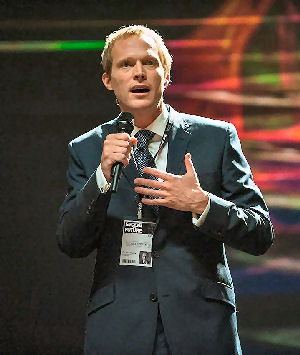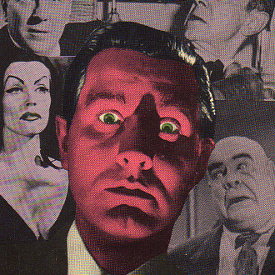The new-to-DVD/Blu-Ray movie Transcendence is about what happens when a human consciousness is downloaded to a computer, versus AI (Artificial Intelligence) consciousness. Johnny Depp plays a computer researcher, Dr. Will Caster, who believes that the event we call The Singularity should more properly be called Transcendence.

What is The Singularity? Well, some say it’s when an actual A.I. is consciously and deliberately created; that is, a non-natural consciousness that has self-awareness (way past the Turing Test). Some say it will be when all (or a majority) of the world’s interconnected computers spontaneously achieve consciousness. The Turing Test, proposed by Alan Turing, is a method to see whether a computer can give answers that cannot be distinguished from human answers—an important step on the way to true A.I. At present, as far as I know, no single A.I.-like entity can pass all facets of the Turing Test. Since we don’t know—at this point—what human consciousness actually consists of, or how it arose, we have no way to “make it happen” in machine terms. (We can simulate A.I. in numerous ways; there are literally thousands of people working on various types of, parts of and ways to achieve A.I. (By the way, the singularity referred to by Will Caster (Depp) in the movie is derived from an argument by Vernor Vinge, who said in a 1993 paper entitled “The Coming Technological Singularity: How to Survive in the Post-Human Era” that an A.I. would, when created, very quickly raise itself to the thousandth power—or, according to Depp’s character, quickly become smarter than every human being who has ever lived, combined.)

I’m satisfied that if humans can deliberately create a functional A.I. we will eventually—if it’s not an unattainable goal—but personally, I kind of favour (in part, thanks to Robert A. Heinlein’s self-aware computer Holmes IV (“Mike” for Mycroft) in 1966’s The Moon is a Harsh Mistress) a computer network attaining such a “neural” mass as to gain intelligence spontaneously. Of course, should either situation happen, we have no way to ensure that such a non-human intelligence would be sympathetic to human desires or needs; indeed, that we could exert control over such an intelligence. (At least if one arises spontaneously through the world’s “neural networks” it will have access to everything humans have ever written, painted, etc., and may have a natural sympathy for us—that is, if emotion is part of its consciousness!)
And there lies the core, the crux of the movie. Between the Turing Test and the possible cold-bloodedness of an actual A.I., which has no viscera with which to empathize with us, how can we be sure we’re not creating a Frankenstein’s monster when we make an A.I.? If it got loose on the Internet, for example, could it not replicate itself all over the globe and take over all computer functions? And if it did so, how would you stop it?
In the slightly future context of the movie—in an unspecified future time which is pretty much the same as our time—Dr. Caster and his wife Evelyn (Rebecca Hall), herself a noted computer A.I. researcher are working with a number of other researchers, both in Berkeley where they live and at labs all over the world including the Lawrence Livermore National Labs in Livermore, California (East Bay, if memory serves); their friends Joseph Tagger (Morgan Freeman) and Tom Casey (Xander Berkeley) are also working in different laboratories; Casey has reputedly uploaded a monkey’s consciousness into a computer. Caster himself has created an A.I. called “PINN”—for Physically Independent Neural Network—and believes he has created a consciousness. Their best friend Max Waters (Paul Bettany), although a doctor, is a skeptic, but sticks with them anyway. But during a fundraiser, Caster is shot at and grazed by an audience member who had previously, during a Q&A session, accused him of trying to create his own God.

There is an anti-A.I. organization called R.I.F.T.—Revolutionary Independence From Technology—that is apparently, like many anti-abortion groups, able to justify the killing of humans in an attempt to keep humanity safe. That shooting took place simultaneous with R.I.F.T. attacks on A.I. research labs all over the country; Dr. Casey was strangled by an attacker, other labs were blown up, and a young man who had worked with Joseph at Lawrence Livermore brought a poisoned birthday cake to work; it was only coincidental that Joseph hadn’t yet eaten his slice when he noticed the silence of the lab. (No pun intended.) When the FBI, represented by Cillian Murphy as Agent Buchanan, comes to see P.I.N.N., Will Caster nearly collapses, and later they find out that the bullet that grazed him was “laced with Polonium, which is an isotope, and when it gets into the bloodstream there is no treatment.” The doctors assure Will he has only about four weeks to live. At the same time, the files from Dr. Casey’s experiment are brought to Caster’s lab, but Caster sets them aside, saying that he wants to spend his last days with his wife.
And here, for the movie-goer who’s been paying attention, is a clue to what’s wrong with this film. It’s not a bad film, but for a movie that’s trying to be a cutting-edge science fiction movie, it is particularly lacking in scientific rigour. Example: Polonium is not an isotope. It’s an element! An isotope of Polonium, Po210, has been used—reputedly—in a political assassination; but according to what I found on the internet, it’s such a rare element (even though trace amounts occur naturally in cigarette smoke) that it takes a major nuclear facility (like a breeder reactor) to produce even 100 grams of it a year. It would make much more sense for them to have laced that bullet with ricin, in my opinion. Also, at the beginning of the movie, Caster staples up a copper mesh in his garden—this is also a key plot point, but I can’t say more—to serve as a Faraday Cage so his wife Evelyn can sit in the garden unmolested by cell signals. Excuse me? I thought everyone knew a Faraday Cage had to be a cube, not just a mesh overhead—and grounded. A mesh overhead is not going to cut the RF/EMF zooming through that garden!

So that’s the first clue that the movie has problems, and it comes shortly after the opening scene, which shows Max walking through the streets of Berkeley “five years” after the events of the movie. He says, through a voiceover, that there are rumours that some cities, like Boston, still have power, and the hint—because we see cars on blocks and broken iPhones in the gutter, as well as someone stripping parts out of old computers on the streets and, oh yeah, people riding bicycles—that power is out all over the world. Max confirms this when he says, in his voiceover, that “the internet was supposed to make the world smaller, but without it, the world seems much smaller.”
In my opinion, five years after a world-wide power crash, there won’t be any happy hippy types riding bicycles through the wide, clean streets of Berkeley—there will still be a massive effort by the survivors (because an instant world-wide power outage will kill millions) just to survive. But let’s get back to the movie.

Okay, short version: Evelyn Caster finds out how Dr. Casey had scanned the monkey’s brain and uploaded it into an existing neural net; she becomes convinced that she—with Max’s help (he is a doctor, after all)—can upload Will’s consciousness into PINN’s core and thereby save him from death. She shuts down PINN and takes (since they have never taken government money, they own PINN) a bunch of the “quantum computing cores” out of PINN’s racks. She and Max set up, in an abandoned school—because the government would surely not sanction this as a human test—a new neural-net computer and upload Caster’s consciousness into it. However, Max doesn’t believe that the new consciousness is really Will—he thinks it’s PINN, faking it. He and Evelyn have a fight and she tells him to get out—he does, and is captured by the local RIFT group, who attempt to turn him. They take his phone and find the location of the school, breaking into the school only seconds after Evelyn hooks Will’s computer up to the internet. (Yet another rub—he’s able to upload his whole consciousness onto the internet in a matter of seconds? What hellacious bandwidth must they have? Sometimes it takes me 30 seconds just to download or upload a Word file, let alone the petabytes of data it must take to hold a consciousness.)
The rest of the movie becomes a race between Will-the-computer and RIFT, now aided by Max; Will quickly becomes that smarter-than-the-whole-human-race computer he described in his funding talk and begins building a giant solar farm in Arizona; he starts using nanotechnology to heal people, and little by little a question begins to creep into Evelyn’s mind: is this really Will, or a clever PINN with Will’s memory, trying to take over the whole human race by use of nanotechnology?

And here I must drop the movie’s description. I had a number of brickbats all ready to throw, too, but I can’t do that without using spoilers and, as you know, I’m kind of “agin ‘em.” The main complaint I can voice about the movie is lack of scientific rigour, as I said earlier. I can’t complain about the actors, the sets or the budget; even in the areas where it becomes a shoot-‘em-up it doesn’t devolve into just another action movie; there are logical script reasons for the shooting and truck chases and so on.
But the movie really doesn’t transcend, because it’s just another “is technology Frankenstein’s monster, come to kill us?” movie in the end. It does attempt, however badly, to rise above that level, but it’s not very convincing. To be successful, it had to convince the technophiles and the technophobes at the same time, and it didn’t really do either one. It spoke the language of technology—mostly, but it was all surface; real technophiles would have known how to solve all the “straw man” issues that the film threw out, without breaking a sweat. To be convincing as a technology movie or as a love story or as a cautionary tale, the film would have had to know what it was talking about rather than just use the language. And that it failed to do.
So I’d give it maybe a seven out of ten; an ambitious failure of script. Oh, well. It’s not, however, deserving of the scorn some people have heaped on it (on IMDB among other places).
If you can, please comment on this week’s column/blog entry. If you haven’t already registered—it’s free, and just takes a moment—go ahead and register/comment here; or comment on my Facebook page, or in the several Facebook groups where I publish a link to this column. I might not agree with your comments, but they’re all welcome, and don’t feel you have to agree with me to post a comment; my opinion is, as always, my own, and doesn’t necessarily reflect the views of Amazing Stories or its owners, editors, publishers or other bloggers. See you next week!
Steve has been an active fan since the 1970s, when he founded the Palouse Empire Science Fiction Association and the more-or-less late MosCon in Pullman, WA and Moscow, ID, though he started reading SF/F in the early-to-mid 1950s, when he was just a sprat. He moved to Canada in 1985 and quickly became involved with Canadian cons, including ConText (’89 and ’81) and VCON. He’s published a couple of books and a number of short stories, and has collaborated with his two-time Aurora-winning wife Lynne Taylor Fahnestalk on a number of art projects. As of this writing he’s the proofreader for R. Graeme Cameron’s Polar Borealis and Polar Starlight publications. He’s been writing for Amazing Stories off and on since the early 1980s. His column can be found on Amazing Stories most Fridays.








